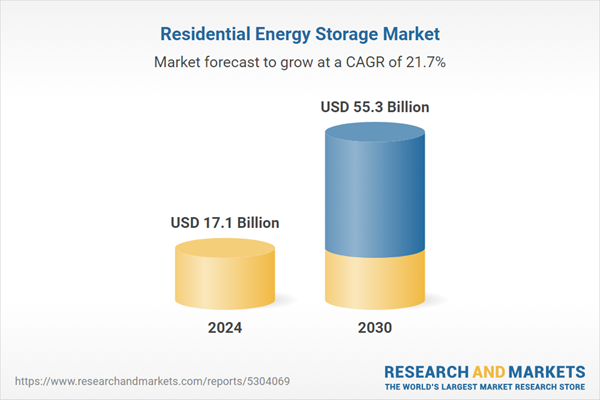Global Residential Energy Storage Market - Key Trends & Drivers Summarized
Residential energy storage systems are becoming increasingly vital in modern households, driven by the rising adoption of renewable energy sources like solar power and the need for reliable backup power solutions. These systems typically use advanced batteries, such as lithium-ion, to store excess energy generated by solar panels or to provide power during grid outages. Residential energy storage not only enhances energy independence but also allows homeowners to optimize their energy usage, reduce utility bills, and contribute to a more sustainable energy grid. Additionally, these systems can participate in demand response programs, providing grid stability and resilience during peak demand periods.The market for residential energy storage is expanding rapidly due to several converging trends. The declining cost of battery technology, particularly lithium-ion batteries, has made energy storage more affordable for homeowners. Moreover, government incentives and rebates for renewable energy installations and storage systems are encouraging adoption. The increasing frequency of extreme weather events and grid reliability issues are also driving demand for home energy storage as a reliable backup solution. Innovations in battery technology, such as improved energy density and longer lifespan, are enhancing the performance and appeal of residential storage systems. Additionally, the integration of smart home technologies and energy management systems is providing homeowners with better control over their energy use.
The growth in the residential energy storage market is driven by several factors. Firstly, the decreasing cost of battery technology is making energy storage more accessible to a broader range of consumers. Secondly, government incentives and policies supporting renewable energy and storage solutions are promoting market adoption. Thirdly, the increasing need for energy reliability and resilience in the face of grid disruptions is boosting demand for home storage systems. Lastly, technological advancements in battery efficiency, smart home integration, and energy management are enhancing the functionality and attractiveness of residential energy storage solutions. These factors collectively contribute to the dynamic growth of the residential energy storage market.
Report Scope
The report analyzes the Residential Energy Storage market, presented in terms of market value (USD). The analysis covers the key segments and geographic regions outlined below.- Segments: Power Rating (3-6 kW, 7-10 kW); Technology (Lithium-Ion, Lead-Acid); Ownership (Customer Owned, Utility Owned, Third-Party Owned).
- Geographic Regions/Countries: World; USA; Canada; Japan; China; Europe; France; Germany; Italy; UK; Rest of Europe; Asia-Pacific; Rest of World.
Key Insights:
- Market Growth: Understand the significant growth trajectory of the 3-6 kW Power Rating segment, which is expected to reach US$40.8 Billion by 2030 with a CAGR of 22.2%. The 7-10 kW Power Rating segment is also set to grow at 20.3% CAGR over the analysis period.
- Regional Analysis: Gain insights into the U.S. market, valued at $5.2 Billion in 2024, and China, forecasted to grow at an impressive 24.8% CAGR to reach $8.3 Billion by 2030. Discover growth trends in other key regions, including Japan, Canada, Germany, and the Asia-Pacific.
Why You Should Buy This Report:
- Detailed Market Analysis: Access a thorough analysis of the Global Residential Energy Storage Market, covering all major geographic regions and market segments.
- Competitive Insights: Get an overview of the competitive landscape, including the market presence of major players across different geographies.
- Future Trends and Drivers: Understand the key trends and drivers shaping the future of the Global Residential Energy Storage Market.
- Actionable Insights: Benefit from actionable insights that can help you identify new revenue opportunities and make strategic business decisions.
Key Questions Answered:
- How is the Global Residential Energy Storage Market expected to evolve by 2030?
- What are the main drivers and restraints affecting the market?
- Which market segments will grow the most over the forecast period?
- How will market shares for different regions and segments change by 2030?
- Who are the leading players in the market, and what are their prospects?
Report Features:
- Comprehensive Market Data: Independent analysis of annual sales and market forecasts in US$ Million from 2024 to 2030.
- In-Depth Regional Analysis: Detailed insights into key markets, including the U.S., China, Japan, Canada, Europe, Asia-Pacific, Latin America, Middle East, and Africa.
- Company Profiles: Coverage of players such as ABB Ltd., Eaton Corporation PLC, Delta Electronics, Inc., BYD Co., Ltd., Enphase Energy, Inc. and more.
- Complimentary Updates: Receive free report updates for one year to keep you informed of the latest market developments.
Some of the 103 companies featured in this Residential Energy Storage market report include:
- ABB Ltd.
- Eaton Corporation PLC
- Delta Electronics, Inc.
- BYD Co., Ltd.
- Enphase Energy, Inc.
- Diamond Electric Mfg. Co., Ltd.
- Eguana Technologies, Inc.
- Echogen Power Systems LLC
- Contemporary Amperex Technology Co., Limited
- Envision Group
- EnergySage
- AZELIO AB
- Enapter Srl
- Electriq Power
- Balqon Corporation
This edition integrates the latest global trade and economic shifts into comprehensive market analysis. Key updates include:
- Tariff and Trade Impact: Insights into global tariff negotiations across 180+ countries, with analysis of supply chain turbulence, sourcing disruptions, and geographic realignment. Special focus on 2025 as a pivotal year for trade tensions, including updated perspectives on the Trump-era tariffs.
- Adjusted Forecasts and Analytics: Revised global and regional market forecasts through 2030, incorporating tariff effects, economic uncertainty, and structural changes in globalization. Includes historical analysis from 2015 to 2023.
- Strategic Market Dynamics: Evaluation of revised market prospects, regional outlooks, and key economic indicators such as population and urbanization trends.
- Innovation & Technology Trends: Latest developments in product and process innovation, emerging technologies, and key industry drivers shaping the competitive landscape.
- Competitive Intelligence: Updated global market share estimates for 2025, competitive positioning of major players (Strong/Active/Niche/Trivial), and refined focus on leading global brands and core players.
- Expert Insight & Commentary: Strategic analysis from economists, trade experts, and domain specialists to contextualize market shifts and identify emerging opportunities.
Table of Contents
Companies Mentioned (Partial List)
A selection of companies mentioned in this report includes, but is not limited to:
- ABB Ltd.
- Eaton Corporation PLC
- Delta Electronics, Inc.
- BYD Co., Ltd.
- Enphase Energy, Inc.
- Diamond Electric Mfg. Co., Ltd.
- Eguana Technologies, Inc.
- Echogen Power Systems LLC
- Contemporary Amperex Technology Co., Limited
- Envision Group
- EnergySage
- AZELIO AB
- Enapter Srl
- Electriq Power
- Balqon Corporation
Table Information
| Report Attribute | Details |
|---|---|
| No. of Pages | 231 |
| Published | February 2026 |
| Forecast Period | 2024 - 2030 |
| Estimated Market Value ( USD | $ 17.1 Billion |
| Forecasted Market Value ( USD | $ 55.3 Billion |
| Compound Annual Growth Rate | 21.7% |
| Regions Covered | Global |









